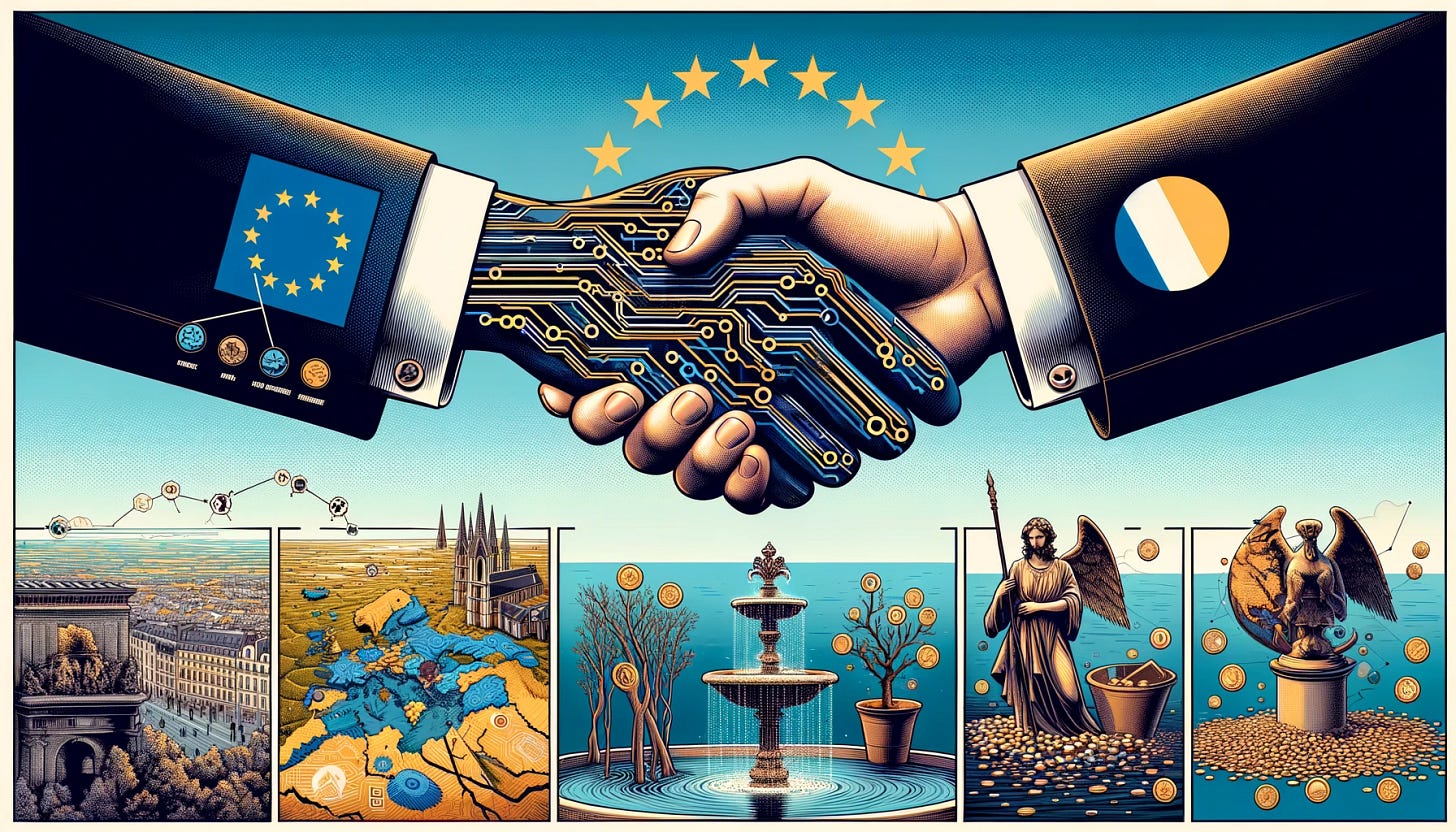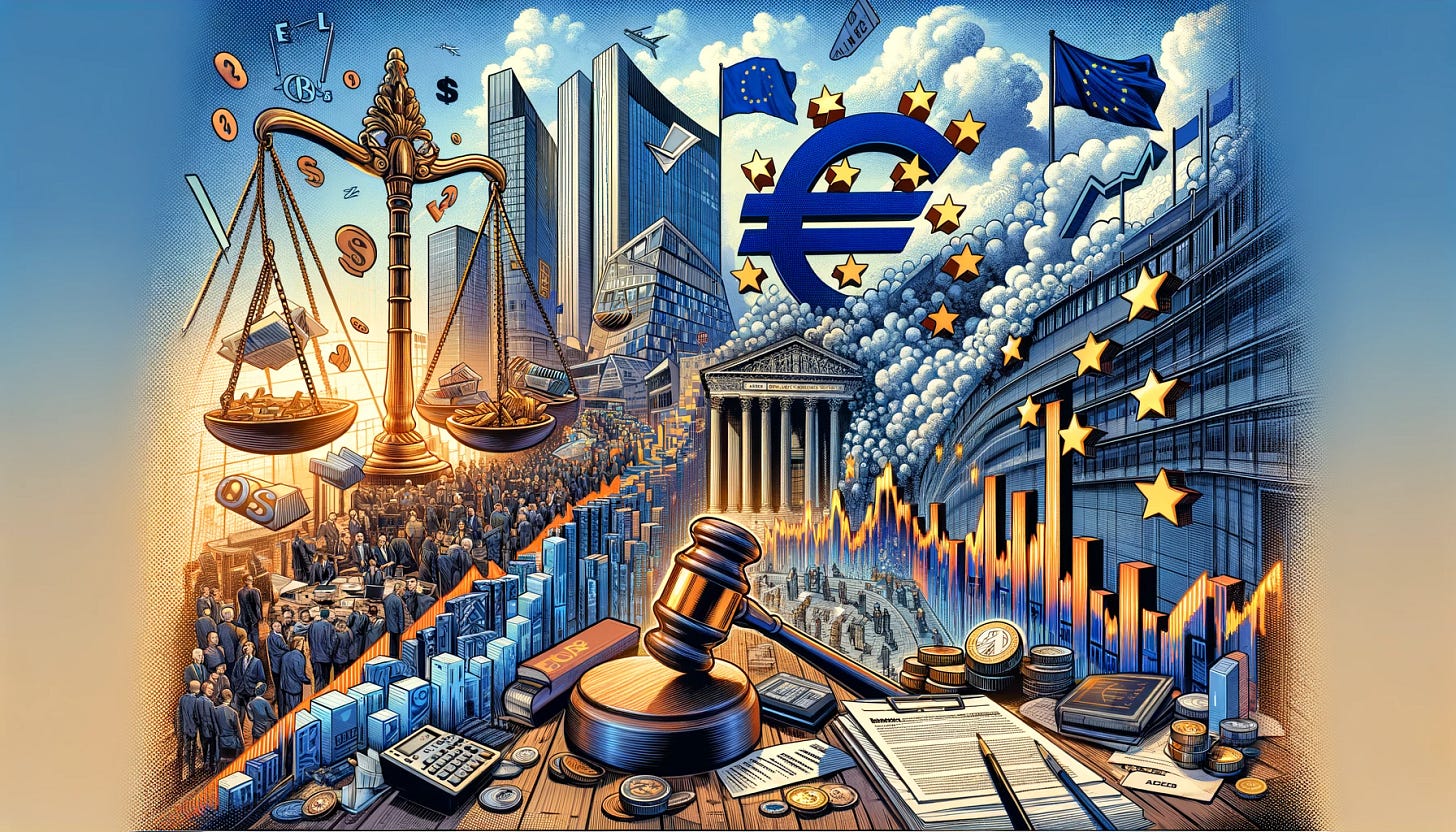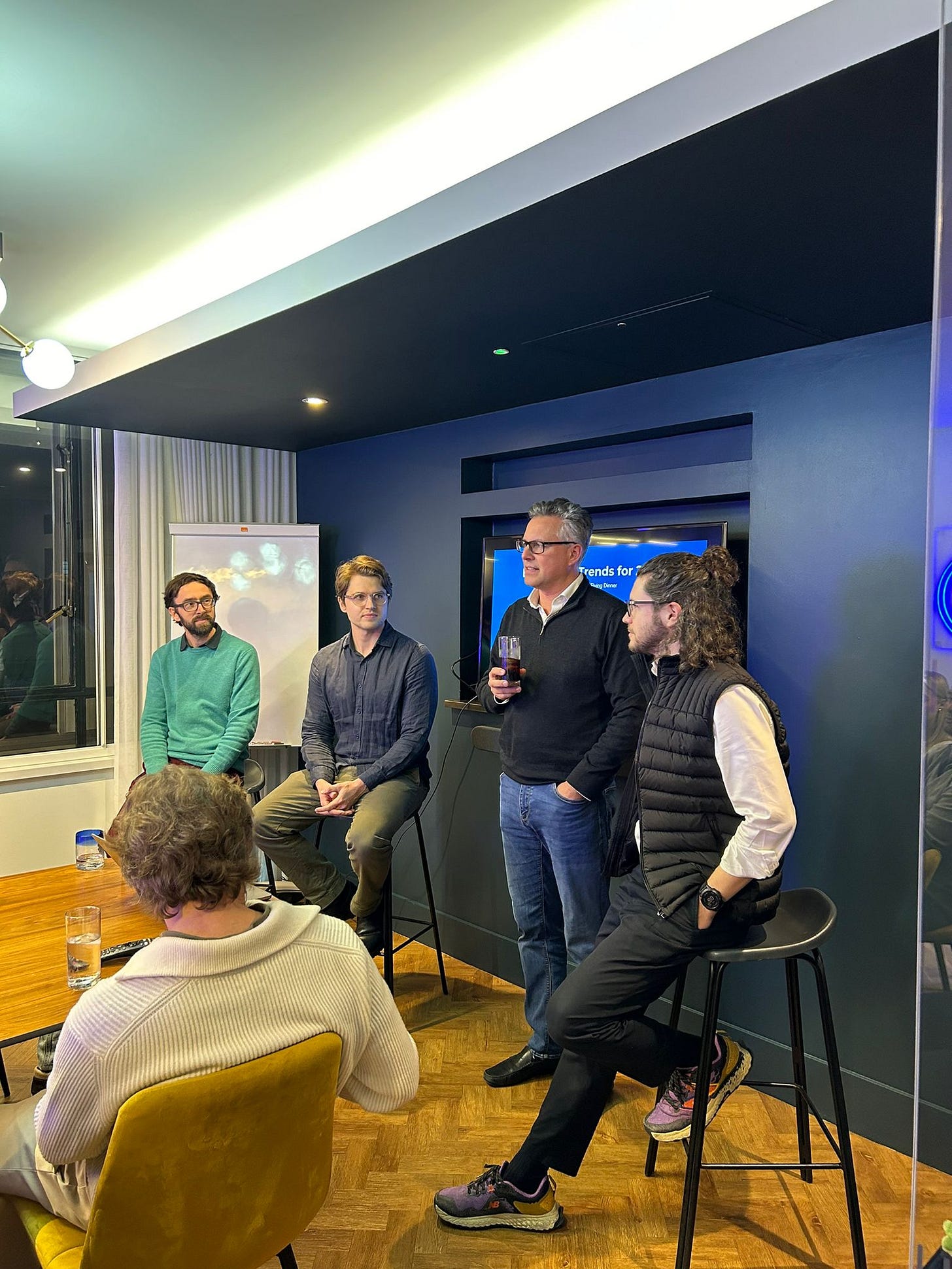EUVC Newsletter 17.02.24 | More on secondaries and Europe's tech sovereignty
Join us as we digest the week's news in European Tech 📰
Let’s welcome 246 LPs, VCs & Angels who have subscribed since our last newsletter. Join the 22,214 that do & share it with your besties
This week, Mistral AI heralded a significant development by welcoming Cédric O, France's former digital minister, as its new co-founder. This strategic alliance marries political insight with technological innovation, setting the stage for Mistral AI to venture into new realms of AI development. The move reignites discussions on European tech sovereignty, highlighting a concerted effort to bolster the continent's digital autonomy. Meanwhile, the European VC scene is contending with a liquidity puzzle, with investors seeking alternatives in secondary markets amidst an IPO dry spell.
Highlights
📊 Market Dynamics Amidst Economic Uncertainty: Despite a robust outlook in U.S. markets, European investors remain wary, closely monitoring U.S. CPI revisions amidst shifting inflationary pressures. This cautious optimism, mingled with concerns over economic recovery and inflation, reflects the complex interplay between global influences and local dynamics.
🌍 EU's Chess Moves: The EU's move to sanction Chinese and Indian companies over Russia ties, alongside the reform of fiscal rules, illustrates a delicate balance between geopolitical strategy and the need for economic stability. These actions reflect the EU's intricate navigation through fiscal austerity and global trade dynamics.
📈 AI and Chips Fuel Market Highs: The frenzy around AI and chipmakers is pushing tech indices to new heights, reflecting a bullish sentiment on innovation and digital transformation.
🚀 The Shy Five's IPO Hesitation: High-profile tech firms' reluctance to go public underscores a broader trend of capital lock-up and the evolving dynamics of liquidity and valuation in the tech sector.
🌱 Climate-Tech's Hot Streak: The European climate-tech sector is thriving, with startups like Tibo Energy and LuxWall securing significant VC interest. This surge underscores a growing commitment to sustainable solutions and energy efficiency.
🚑 Healthcare's Chilly Season: A downturn in PE healthcare deal-making points to broader concerns around high interest rates and operational challenges. This trend may signal a period of recalibration for investors in the healthcare sector.
💰 Secondaries' Slump: The dip in secondaries funds' performance reflects broader market recalibrations, with implications for liquidity and valuation in the VC landscape.
🌐 Crypto's Cautious Comeback: The uptick in crypto deal value suggests a tentative recovery, but the sector remains under scrutiny amid regulatory and market challenges.
📉 Snatching Up Startups: The trend of selling VC stakes at markdowns reflects a strategic pivot amid a challenging exit environment, highlighting the nuanced strategies investors are adopting to navigate uncertainty.
👩💼 Funding for Female Founders: Despite a rise in VC deals involving female founders in Europe, the funding disparity remains stark. With only 5.2% of rounds led solely by women, the need for equitable investment practices is more pressing than ever, underscoring a critical area for VC introspection and action.
🚖 Ride-Hailing's Financial Juggles: Lyft's first-ever cash generation contrasts with Uber's strategic $7 billion stock buyback to manage dilution, highlighting diverse financial strategies in the gig economy. Both moves reflect the intricate dance of maintaining shareholder value and profitability amidst market uncertainties.
📱 Meta's Fee Fight: Meta's challenge against the EU's DSA fee highlights ongoing tensions around digital governance and cost-sharing among tech giants. This dispute may set a precedent for future regulatory engagements.
🏦 ECB's Supervisory Shift: The ECB's focus on new risks, including climate change and cybersecurity, signals a proactive approach to banking supervision amid evolving global challenges.
💡 "Emotional Equity" Rising: Startups across Europe are increasingly pledging equity to nonprofits, mirroring the trend sparked by notable entrepreneurs. This not only showcases a commitment to social causes but also signals a shift towards more value-driven investments.
🤖 Robo-Revolution: OpenAI's development of task-specific AI agents heralds a new era for the European tech landscape, promising to redefine mundane tasks and data handling, thereby potentially boosting productivity and innovation.
💪 Europe’s AI Power Play: Mistral AI, co-founded by France's ex-digital minister, is a testament to Europe's growing prowess in competing with global AI giants. This move not only exemplifies the fusion of political insight and tech innovation but also underscores Europe's strategic shift towards nurturing deep tech ecosystems.
Read the deep dive below.
Want more insights like this directly into your inbox every week?
As a member you get:
🌟 Curated investment opportunities, including access-constrained deals.
🤝 Privileged connections with inspiring people in the industry, building strong networks and relationships across Europe.
🔍 Proprietary insights into cutting-edge tech and emerging markets.
📖 Access to best practices, skill development, and valuable insights to enhance your investment expertise.
💸 Exposure and access to the asset class we all love - Venture Capital.
And the best part? You get all of this for FREE, as long as you remain an active and engaged member.
AI and Climate Tech
The emergence of AI agents, as pioneered by entities like OpenAI, signals a paradigm shift towards enhancing operational efficiencies and automating routine tasks. European startups, leveraging such technologies, are positioned at the forefront of this transformative wave, potentially redefining sectors ranging from healthcare to fintech and beyond.
Climate technology, on the other hand, is experiencing a renaissance, fueled by a collective commitment to sustainability and green innovation. The substantial VC interest in startups like Tibo Energy and LuxWall underscores a growing recognition of the pivotal role these enterprises play in addressing the climate crisis. This trend not only reflects a strategic alignment with global sustainability goals but also highlights the increasing attractiveness of green technologies as viable investment avenues.
The Gender Funding Gap
Amid these technological shifts, the issue of funding disparities for female founders remains a critical concern. Despite a notable increase in the share of VC deals involving female founders in Europe, the funding levels for these entrepreneurs lag significantly.
In 2024, the participation of women in the VC arena showed some progress, with startups having at least one female co-founder involved in 20.2% of all deals. This is a notable increase that signifies a positive shift towards inclusivity. However, when it comes to the actual funding amounts, the disparity becomes evident. These startups collectively managed to secure €10.6 billion across 2,333 deals, which, when compared to their male counterparts, suggests there is still a long road ahead to achieving true financial equity. This data highlights the systemic challenges female entrepreneurs face in accessing capital, a crucial component for scaling and sustaining their businesses.
Adapting to a Shifting Landscape
The European regulatory environment is in a state of flux, with initiatives such as the EU's Digital Services Act (DSA) and fiscal reforms shaping the operational and investment frameworks within which startups and VCs operate. The ongoing legal challenges by tech giants against regulatory fees and the EU's sanctions on companies in mainland China and India highlight the complex interplay between policy, commerce, and technology. These developments necessitate a nuanced understanding of the regulatory landscape, guiding strategic investment decisions and portfolio management.
On the macroeconomic front, the diverging trends in stocks and bonds in the European markets reflect a nuanced investor sentiment, particularly concerning inflation. The recent rally in stocks, coupled with a sell-off in bond markets, suggests a waning concern over inflation among investors, who are perhaps more attuned to the prospects of economic growth and technological innovation driving returns. This sentiment is further complicated by the European Central Bank's (ECB) stance on interest rates, with officials like Fabio Panetta suggesting a potential easing despite ongoing inflationary pressures. The ECB's position, indicative of a delicate balance between fostering economic growth and maintaining price stability, presents both challenges and opportunities for the VC sector. Investors might find solace in the potential for interest rate cuts stimulating economic activity, yet the specter of inflation looms, threatening to erode real returns and consumer purchasing power.
Liquidity Conundrum
In the face of an IPO dry spell, VCs are increasingly turning to secondary markets, sacrificing potential future gains for immediate liquidity. This trend, driven by a desire to mitigate risk and capitalize on current valuations, reflects a strategic recalibration within the VC model, emphasising the importance of flexibility and adaptability in an uncertain market landscape.
The performance of secondaries funds, which hit a low point in 2023, further complicates the liquidity equation. However, with valuation stabilization on the horizon, a rebound in deal flow and fund performance may be afoot, offering a glimmer of hope for investors navigating the secondary market landscape.
Google's AI Initiative
Google's commitment of 25 million euros to enhance AI skills across Europe is a testament to the critical need for advanced digital competencies in sustaining the continent's competitive edge in the global technology arena. This initiative not only aims to democratize access to AI education but also to catalyze innovation across various sectors by equipping individuals and organizations with the necessary tools and knowledge to harness the power of AI effectively. By offering "growth academies" and extending its free AI online training to encompass 18 languages, Google is laying down a foundational infrastructure for upskilling and reskilling, thereby addressing the acute shortage of AI talent.
European tech sovereignty
The narrative around Mistral AI gains a compelling dimension with the onboarding of Cédric O, France's former digital minister, as a co-founder. This strategic addition to the Mistral AI team brings a blend of political acumen and digital expertise to the startup's ambitions. Cédric O's transition from a governmental role to the forefront of entrepreneurial innovation encapsulates a unique fusion of policy-driven insights with cutting-edge technological aspirations. This move signifies a bold step towards leveraging political and technological synergies to drive forward Europe's AI capabilities, aligning closely with the broader objectives of enhancing the region's digital infrastructure and fostering innovation from within.
This intersection of political vision and technological innovation, embodied by Mistral AI's new co-founder, Cédric O, underscores a broader theme of European tech sovereignty. Cédric O's political background, marked by a staunch advocacy for digital autonomy and a regulated approach towards global tech giants, aligns with the European Union's increasing focus on digital sovereignty. By championing European AI advancements through Mistral AI, Cédric O is effectively translating his political agenda into actionable entrepreneurial initiatives. This endeavor not only contributes to the diversification and strengthening of Europe's AI landscape but also resonates with the EU's strategic ambitions to assert its digital independence and leadership on the global stage.
The Rise of European VC Secondaries
by Joe Schorge, Founding Managing Partner at Isomer Capital
Over the last few months, we have witnessed a surge in secondary deals in the European VC space. Whether LP stakes, technology company shares, GP stakes, or other secondary assets in Venture Capital. At Isomer, we have observed a sharp increase in secondary deal flow with 4 times more deals year-on-year coming our way. The correction in the market has caused exits to be delayed in some cases. This has pushed many stakeholders to consider selling positions on the secondary market to de-risk mature portfolios and receive some liquidity on or ahead of schedule.
Drivers for the increase in the volume of secondary assets are summarised below:
1. Market Expansion and Historical Growth: Over the last 12 years, European venture-funded tech assets have experienced compound growth, reaching an all-time high. A staggering €301 billion has been invested in European VC over the past five years, creating a robust and enduring secondary opportunity set.
2. Liquidity Challenges in Europe: While the continent has been a breeding ground for innovative companies, till now, there has been a disproportionate amount of secondary liquidity relative to the surge in primary activity. This surge of LP investments into VC has created over 3,000 firms since 2010, resulting in a record volume of stock. The combination of increased stock and restricted portfolio rebalancing solutions for LPs has created a burgeoning secondary market.
3. Unicorns on the Rise: The European tech scene has witnessed the creation of over 350 unicorns in the last decade, signalling a profound evolution in the market dynamics and not only increased stock, but high-quality stock. Many entrepreneurs and early-stage investors are looking to get some liquidity out of those successes.
For buyers looking to purchase secondary assets in the venture space, it is an interesting opportunity. However, it requires specific skills compared to more mature and intermediated secondary assets in the buyout space. There are a lot of inefficiencies in the sector. Evaluating the assets is more difficult as some companies don't have similar data sets to offer. This creates unique opportunities for buyers equipped with asset-relevant transactional skills and data sets, leading to faster exits and better IRR.
Blockchain Trends for 2024
by Freddie Macpherson, Associate at Isomer Capital
Question: What is blockchain in seven words?
Answer: A response to the Global Financial Crisis.
On Monday, 29th January, Very Early hosted an information workshop for those looking to learn more about the crypto realm. The panel discussed a range of topics. Such as current blockchain trends, stablecoin applications, global adoption scenarios, and future directions for the technology. the challenges, exciting developments, and the potential impact on various verticals. We have included the key takeaways from the session below.
Stablecoins Reach Product-Market Fit:
Use cases: facilitating trade in emerging markets where there are currency risks.
Adoption: Stablecoins are the biggest application to come out of on-chain technologies. USDT (USD-backed stablecoin) is the largest stablecoin, with 71% of the market share and a $97bn market cap.
Motivations: financially motivated activities, on-chain finance, and DeFi transactions.
Global Adoption:
Turkey: The inflation of local currency has increased crypto adoption. Demand for stablecoins such as USDT is being used as an alternative for USD, asset protection, and accepting USDT in exchange houses, enabling crypto transactions.
Nigeria: Digital marketing using stablecoins due to unreliable local currencies, mitigating forex fluctuations.
Opera Browser, an Example of a Global Market From Day One:
Opera browser has built and integrated an in-app wallet for P2P (peer-to-peer) payments. The wallet (and browser) has gained quick traction due to the built-in solution and ability to handle small transfer amounts. 1.3 million wallets have been created since September 2023.
Transactions are tracked on-chain, demonstrating real-world usage.
Looking to the Future:
Blockchain evolution has been compared to the early days of the Internet. The Internet wasn’t created to digitalize newspapers. As the internet grew, many more use cases emerged over time. If we draw parallels to crypto, there will likely be many more use cases down the line for Blockchain.
Interoperability is a crucial element; blockchain solutions allow anyone to connect in a permissionless, frictionless way, empowering activity.
V1.0 has been very public to date; the next stage could likely re-include stronger elements to protect user privacy.
Predicting future applications is challenging, but advancements are already happening in Layer2s to address the limitations. E.g. bringing transaction costs down.
Achieving complete decentralisation on the application layer is highly challenging. There must be a trust assumption included.
Will stable coins replace fiat currencies...? It’s too early to tell
Want to know more about what’s happening in Crypto? Watch our roundtable conversation with Jan Baeriswyl, Founding Partner at Very early, Felix Machart, Partner at Greenfield and Anirudh Pai, Partner at Dragonfly.
Links & Resources
Inc.com: Discusses startups pledging equity to nonprofits as a new form of philanthropy.
Bensbites: Covers OpenAI's development of AI agents for automating tasks.
PitchBook: Highlights climate-tech startups and investment trends in 2024.
PitchBook: Discusses the downturn in PE dealmaking in healthcare services in 2023.
TechCrunch: Details Meta's challenge against the EU's Digital Services Act supervisory fee.
Financial Times: Covers various economic events and shifts in the UK and Europe.
PitchBook: Provides a perspective on the improving climate for US private markets in Q1 2024.
Financial Times: Reports on Fabio Panetta's suggestion to cut interest rates in the Eurozone.
Financial Times: Discusses the EU's reform of its fiscal rules.
Reuters: Reports on Google's commitment to boost AI skills in Europe.
Financial Times: Covers the EU's plan to impose sanctions on Chinese and Indian companies.
Sifted.eu: Discusses Cédric O's cofounding of Mistral AI and his views on regulation and innovation.
PitchBook: Analyzes the performance of secondaries funds in Q2 2023.
Financial Times: Discusses the global bond market sell-off and the rally in stocks.
OpenAI: Announces the testing of a memory feature in ChatGPT.
PitchBook: Provides insights into the crypto market's recovery in Q4 2023.
PitchBook: Discusses the trend of selling VC stakes at discounts.
PitchBook: Reports on the funding landscape for female founders in Europe.












